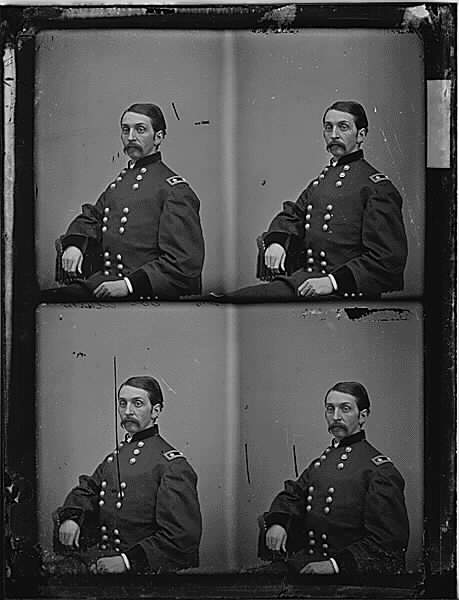Born at Norwalk, Connecticut, on June 29, 1831, he reportedly struck out on his own at the age of 13.
He was admitted to the New York Bar in 1854 and moved two years later to Davenport, Iowa, where he began the practice of law.
In 1861, he recruited the 13th Iowa Volunteer Infantry. He was First Lieutenant and Adjutant of the Regiment until March 5, 1862 when he was promoted Captain. Until the end of the war he had staff rank and eventually was prompted Lieutenant Colonel, Assistant Adjutant General and Brigadier General of Volunteers, May 31, 1865. He was breveted Brigadier General, United States Army, for gallant and meritorious service at the battle of Atlanta, where he served as James McPherson’s Adjutant and also Major General, U.S. Volunteers, in November 1865 for gallant and meritorious services in the war.
Still holding his volunteer commission, he arrived in Texas, a full-blown carpetbagger. After helping to organize a bank in Galveston, he was soon closely allied with the leader of that town’s Negroes, who succeeded in 1869 in electing him to the House of Representatives as an exponent of reconstructing Texas. He advocated the sale of West Texas lands for the benefit of the railroads in which he was reputed to have an interest.
Defeated for reelection in 1871 by a Conservative Democrat, but certified by a corrupt Republican Governor who threw out more than 3,000 opposing votes, he was later expelled from the House of Representatives by a unaminous vote of both parties.
He soon obtained a position in the Bureau of Revenue. which he occupied until he died in New York City on October 12, 1905. He was buried in Section 3 of Arlington National Cemetery.
Courtesy of the Congress of the United States:
Representative from Texas; born in Norwalk, Conn., June 29, 1831; self-educated; taught school in Norwalk, Conn., in 1846; studied law in New York City; was admitted to the bar in 1855 and commenced practice in Davenport, Iowa, the same year; during the Civil War served in the Union Army; commissioned first lieutenant and adjutant of the Thirteenth Iowa Infantry November 2, 1861; successively commissioned captain and assistant adjutant general, major and adjutant general, and lieutenant colonel and assistant adjutant general; brevetted brigadier general of volunteers July 22, 1864, and major general November 24, 1865; engaged in banking in Galveston, Tex.; upon the readmission of the State of Texas to representation was elected as a Republican to the Forty-first Congress and served from March 31, 1870, to March 3, 1871; presented credentials as a Member-elect to the Forty-second Congress and served from March 4, 1871, to May 13, 1872, when he was succeeded by De Witt C. Giddings, who contested his election;
postmaster of Galveston from June 19, 1872, to May 7, 1874; employed in various offices of the Government at Washington from 1876 to April 12, 1880, when he became chief clerk of the Internal Revenue Department, serving until June 30, 1883; moved to Fargo (now in North Dakota) in 1883 and continued the practice of law; also served as assistant editor of the Fargo Daily Argus; moved to Denver, Colo., in 1890 and practiced law; went to Washington, D.C., in 1898 and was employed in the Internal Revenue Service as a special inspector and served until his death in a hospital in New York City, October 12, 1905; interment in Arlington National Cemetery.
Michael Robert Patterson was born in Arlington and is the son of a former officer of the US Army. So it was no wonder that sooner or later his interests drew him to American history and especially to American military history. Many of his articles can be found on renowned portals like the New York Times, Washingtonpost or Wikipedia.
Reviewed by: Michael Howard

